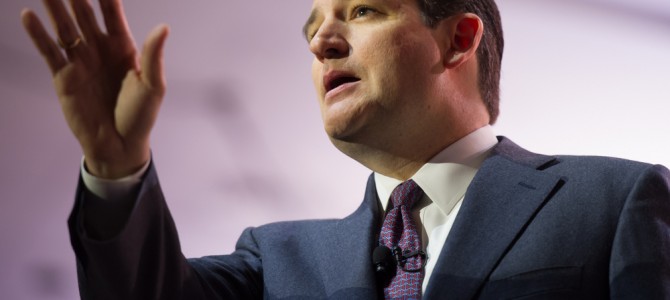
Earlier in the primary season, when the frontrunners were just beginning to emerge, I expressed concern that Cruz was untrustworthy. It wasn’t just my vaguely bitter recollection of Cruz’s actions in the government shutdown fiasco, but something about his personality—the inflection of his voice, the way he too often lowered it to a whisper, the way he paced back and forth across the stage like a fired-up Baptist preacher going off his sermon notes, except I knew that he carefully chose every talking point, every word.
Although I knew Cruz has one of the highest-rated conservative records in the race (98 percent lifetime average from the Heritage Foundation), I was convinced he’d be unable to build the necessary coalitions to “get things done,” much less win the election, because he wasn’t a team player. Not only that, I thought I couldn’t trust him.
Cruz Is Unlikable, But Principled
My beliefs about Cruz’ methods and personality began to change after reading two articles. The first was from National Review editor Rich Lowry, who contended that Cruz was being compared to the wrong twentieth-century presidential candidate. Lowry says Cruz isn’t destined to lose in a landslide like Goldwater, but that he is much more like Richard Nixon, minus the paranoia, plus a more heavily defined ideology.
The two are similar in personality: “Cruz is cut from roughly similar cloth. He wears his ambition on his sleeve and isn’t highly charismatic or relatable. In high school, he could’ve been voted most likely to be seen walking on the beach in his dress shoes. If Cruz wins the nomination, it’ll be on the strength of intelligence and willpower. He’ll have outworked, outsmarted, and outmaneuvered everyone else.”
Their backgrounds are different. Lowry mentions that, unlike Nixon, Cruz attended Ivy League universities that would typically entitle him to a spot among the elite, if he wanted it. But he doesn’t, and such elites, as well as his Senate colleagues, have a “genuine personal dislike” for Cruz, even if he frames such antipathy as the typical establishment attitude toward a potential upsetter of the status quo—or, as Lowry puts it, “a lonely man of principle.”
Cruz doesn’t want or need approval from the political elite. He isn’t seeking to be well-liked among the electorate, probably because he knows he just isn’t likable. Cruz will never be Joe Biden or Marco Rubio. He doesn’t have a beaming smile or endearing anecdotes or a twinkle in his eye. But his shrewdness, calculation, and disregard for elite approval can make him a winning candidate—and, what’s more, a pretty good conservative president.
We Don’t Want a ‘Nice’ President
The second article that brought me closer to this realization was from David French, who took on the conception that Cruz is an unacceptable candidate because he isn’t a “good Christian.” Some, including many evangelical voters, claim he is divisive and overly ambitious; David Brooks wrote that Cruz subscribes to “pagan brutalism.”
Except being nice isn’t the same as being a good Christian, and plenty of nice guys don’t take their faith seriously, compromising at every turn. Instead, what we see with Cruz is a guy who is personally off-putting but consistently stands for his principles. French writes:
The sad truth is that pundits, the secular public, and all too many Christians confuse ‘nice’ with ‘Christian.’ Thus, they judge one’s authentic Christianity by superficial measures such as tone, or define concepts such as justice or mercy through a non-Christian lens. In reality, however, the finest of Christians adopt a wide variety of dispositions, and even the most winsome and gentle find themselves rejected and scorned if they hold firm on questions of life and sexual morality. An authentic Christian simply cannot ‘nice’ his way into elite applause.
Hunter Baker here at The Federalist had a slightly different take in explaining Cruz’ behavior and rhetoric, but it compliments French’s perspective: “Cruz comes off much less as a Christian who brings a holistic view of the faith to politics and much more as a pure Reaganite conservative.” Put more succinctly, “Cruz is really just a conservative who is also a Bible-believing Christian.”
Being Likable Isn’t Everything
Certainly, being likable and “nice” are big pluses in politics, but they aren’t everything. More importantly, they shouldn’t decide whether you can trust a candidate (as much as you can with someone you’ve likely never met) to not totally screw it up.
Conservatives and libertarians are inherently distrusting of government and its operators, as we should be. We should maintain a skeptical view not only during elections, but across the whole spectrum of government action. You should expect from your candidate, if elected, minor policy variations, some unexpected military decisions, and that many promised bills won’t pass.
Come election day, however, you have to pull the lever for someone. That candidate shouldn’t be chosen based on whom you’d prefer to have a beer with; rather, it should be the candidate you trust most to remain aligned with your shared values and principles.
Maybe that principled guy (or gal) is also the one you’d enjoy chatting with over a cold one, but maybe it isn’t. Let’s not make the same mistake I did by confusing not liking someone with not trusting him. We should also realize this is indeed a mistake before it’s too late, because Cruz is our best shot at defeating both Trump and probably the Democratic nominee.
When so many on the Right feel the same wariness and cynicism that I did about the senator, it strikes me as ironic that Cruz’ campaign slogan cleverly combines “trust” and his name into the adjective he believes best describes him: “Trust Ted—Trusted.” Maybe it’s time to do just that.









